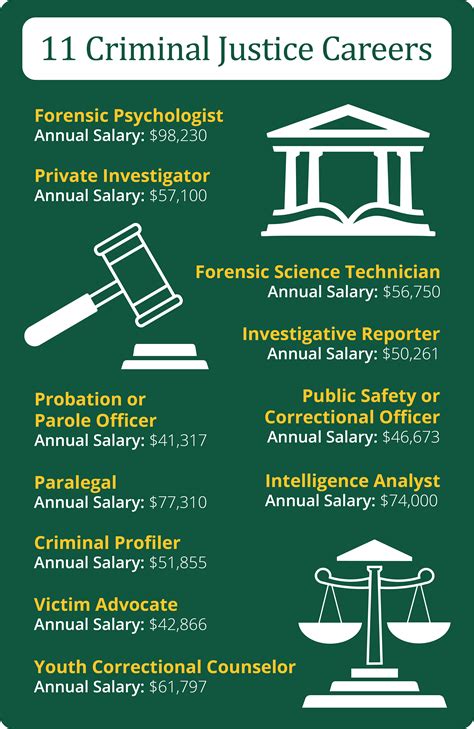Introduction

In today’s society, criminal justice professionals play a crucial role in maintaining law and order. With a bachelor’s degree in criminal justice, graduates are equipped with the knowledge, skills, and analytical abilities to excel in a wide range of fields within the criminal justice system. This article delves into the diverse employment opportunities available for criminal justice degree holders, exploring their earning potential, growth prospects, and the factors influencing their job satisfaction.
High-Demand Careers with a Criminal Justice Degree
Law Enforcement
Police Officer
Police officers are the backbone of law enforcement, responsible for patrolling communities, responding to emergencies, and investigating crimes. According to the Bureau of Labor Statistics (BLS), the median annual salary for police officers is $63,380. The projected job growth rate for this occupation is 7% from 2021 to 2031, faster than the average for all occupations.
Corrections Officer
Corrections officers supervise inmates in jails and prisons, ensuring their safety and security. The BLS reports a median annual salary of $57,680 for corrections officers, with a 4% projected job growth rate from 2021 to 2031.
Probation and Parole Officer
Probation and parole officers work with offenders who have been convicted of crimes but are serving their sentence outside of prison. They monitor and supervise these individuals, providing guidance and support to help them successfully reintegrate into society. The BLS estimates a median annual salary of $55,740 for probation and parole officers, with a 5% projected job growth rate from 2021 to 2031.
Security and Investigation
Private Investigator
Private investigators gather information and conduct investigations on behalf of individuals, businesses, and organizations. The BLS reports a median annual salary of $54,680 for private investigators, with a 11% projected job growth rate from 2021 to 2031, much faster than the average for all occupations.
Security Guard
Security guards protect people and property in a variety of settings, including businesses, schools, and hospitals. The BLS estimates a median annual salary of $30,230 for security guards, with a projected job growth rate of 3% from 2021 to 2031.
Legal and Court Services
Paralegal
Paralegals perform legal research, prepare legal documents, and assist attorneys with case preparation. According to the BLS, the median annual salary for paralegals is $56,230, with a 15% projected job growth rate from 2021 to 2031, much faster than the average for all occupations.
Court Reporter
Court reporters provide transcripts of court proceedings and other legal documents. The BLS reports a median annual salary of $61,650 for court reporters, with a 10% projected job growth rate from 2021 to 2031, faster than the average for all occupations.
Other Career Paths
In addition to the core criminal justice fields, graduates with a criminal justice degree can also pursue careers in:
- Victim Services
- Forensic Science
- Juvenile Justice
- Homeland Security
- Public Policy
Factors Influencing Job Satisfaction
Intrinsic Motivations
- Interest in the criminal justice system
- Desire to make a difference in society
- Feeling of purpose and fulfillment
- Opportunity for advancement
Extrinsic Factors
- Salary and benefits
- Job security
- Work-life balance
- Opportunities for professional development
Common Mistakes to Avoid
- Not Networking: Criminal justice is a competitive field. Building relationships with professionals in the industry is crucial for expanding job opportunities.
- Relying Solely on Job Boards: Explore alternative job search methods, such as industry events and professional organizations.
- Ignoring Specialized Training: Gaining specialized skills, such as firearms training or legal research, can make you more competitive in the job market.
- Overlooking Soft Skills: In addition to technical qualifications, soft skills like communication, teamwork, and ethical decision-making are highly valued in criminal justice careers.
- Ignoring Career Planning: Actively reflect on your interests, strengths, and goals to identify the best career path for you.
Tables
Table 1: Median Annual Salaries for Criminal Justice Occupations
| Occupation | Salary |
|---|---|
| Police Officer | $63,380 |
| Corrections Officer | $57,680 |
| Probation and Parole Officer | $55,740 |
| Private Investigator | $54,680 |
| Security Guard | $30,230 |
| Paralegal | $56,230 |
| Court Reporter | $61,650 |
Table 2: Projected Job Growth Rates for Criminal Justice Occupations
| Occupation | Growth Rate |
|---|---|
| Police Officer | 7% |
| Corrections Officer | 4% |
| Probation and Parole Officer | 5% |
| Private Investigator | 11% |
| Security Guard | 3% |
| Paralegal | 15% |
| Court Reporter | 10% |
Table 3: Skills and Traits Required for Criminal Justice Careers
| Skill | Trait |
|---|---|
| Analytical | Problem-solving |
| Communication | Ethics |
| Interpersonal | Leadership |
| Observation | Teamwork |
| Research | Written communication |
Table 4: Motivations for Pursuing Criminal Justice Careers
| Intrinsic | Extrinsic |
|---|---|
| Interest in the criminal justice system | Salary and benefits |
| Desire to make a difference in society | Job security |
| Feeling of purpose and fulfillment | Work-life balance |
| Opportunity for advancement | Opportunities for professional development |
Conclusion
A criminal justice degree opens doors to a wide range of rewarding and stable career opportunities. Graduates can choose from various fields, including law enforcement, security, investigation, legal services, and other related professions. By understanding the earning potential, growth prospects, and job satisfaction factors for these occupations, criminal justice degree holders can make informed decisions about their career paths. With the right combination of education, skills, and motivation, they can make meaningful contributions to the criminal justice system and society at large.
